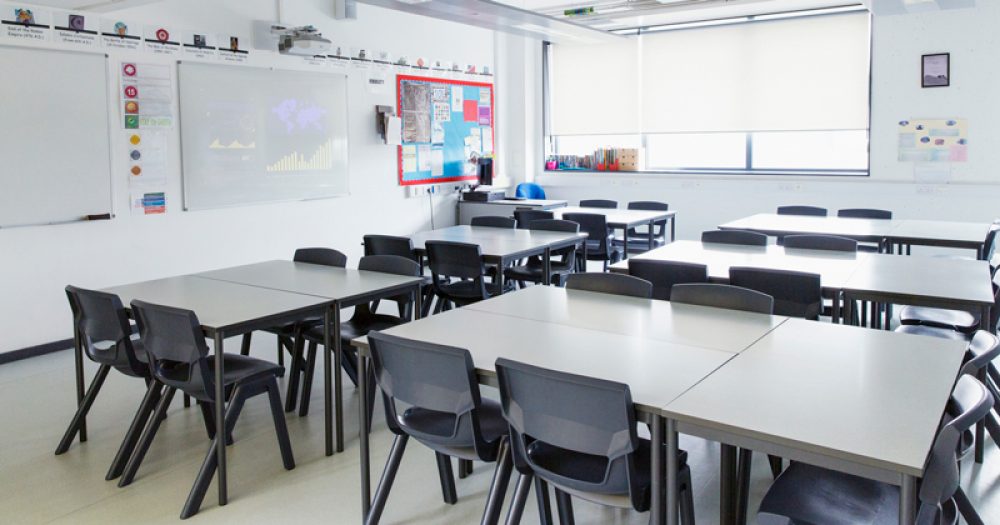Nine schools and academy trusts will become “attendance hubs” under plans to expand a pilot scheme, while a mentoring programme aimed at tackling absence will be extended to four more areas of England.
The Department for Education has named seven academies and two alternative provision trusts that will between them support 600 schools to “improve their attendance by sharing effective practice and practical resources” (full list below).
And an attendance mentoring programme currently being trialled in Middlesbrough will be extended to Knowsley, Doncaster, Stoke-on-Trent and Salford, with an aim to work with 1,665 persistently and severely absent children.
Expansion of the two programmes form part of a government drive to improve attendance, which has stalled following the Covid-19 pandemic.
Schools minister Nick Gibb said the “best place for children to learn is in the classroom, and the vast majority of children are currently in school and learning”.
“Though pupil attendance is continuing to recover, the pandemic has still had a real impact on pupil absence in school.”
Proposals ‘barely scratch the surface’
But Julie McCulloch, director of policy at the ASCL school leaders’ union, said the support “barely scratches the surface of this problem”.

A Schools Week investigation last year investigation last year revealed more than 600 council attendance support staff had been cut in the past 10 years
McCulloch said absence issues were “driven largely by a rising tide of mental health problems, such as depression and anxiety, which are exacerbated by the cost-of-living crisis.”
She urged the government to “provide solutions that address the root causes of absence”.
“As ever, this is likely to take investment in terms of staffing and specialist mental health support, and the government’s record on providing the necessary resources is sorely lacking.”
Absence remains high post-Covid
Data published on Thursday shows absence last autumn was 7.5 per cent – higher that the 6.9 per cent absence rate in autumn 2021.
More than 1.7 million pupils, around 24 per cent of the total population, missed 10 per cent or more possible sessions across the term, while 125,000 (1.7 per cent) missed 50 per cent or more.
The DfE said the mentoring programme, which is led by children’s charity Barnardo’s, was funded with £2.32 million from existing DfE budgets. The hubs scheme is “sector-led” and receives no extra funding.
North Shore Academy, part of the Northern Education Trust, was the first attendance hub in the country, and has reported “significantly improved” attendance rates. Last year its absence rate was 8.2 per cent, compared to 9 per cent in secondary schools nationally.
In pre-pandemic 2018-19, the school’s absence rate was 7.5 per cent, compared to a national average of 5.5 per cent.
The school is now extending its work to headteachers running schools in “similar circumstances”.
The nine new attendance hubs are as follows:
- Bar Hill Community Primary School, Meridian Trust
- Wallscourt Farm Academy, Cabot Learning Federation
- Abbots Green Primary Academy, Unity Schools Partnership
- Willows Academy, DELTA
- Eden Boys School, STAR Academies
- Ely College, Meridian Trust
- St Edward’s Church of England Academy, Unity Schools Partnership
- Olive Academies, an alternative provision trust based in the East of England
- River Tees Academies, an alternative provision trust based in the North East
DfE launches ‘call for evidence’
The DfE has also today launched a “call for evidence” on children missing education – those neither on a school roll nor being “suitably” home educated.
Government warned there was “currently variation” in how the sector “identifies and supports” such children. They “want to ensure that everybody has the information, skills and tools they need to do this effectively”.
The evidence call is “intended to allow respondents to put forward ideas and proposals for change, and justification for such change”.
Ministers have “not made any decision on these issues but does want to hear what more can be done to improve the CME system to support all children to achieve their potential”.
The call for evidence is open until July 20.
Older pupils more likely to be home-educated
The DfE has also today published the outcome from its first survey of councils on the number of children in elective home education across England.
The findings are similar to those of a Schools Week investigation earlier this year, which first revealed that around 125,000 children were home educated at some point in the 2021-22 academic year.
The most common reason for home educating children was “philosophical or preferential reasons”, cited in 16 per cent of cases.
However, in 21 per cent of cases councils stated the primary reason was “unknown”, and parents did not give a reason in another 14 per cent of cases.
Older pupils were most likely to be home educated, with a third of those taught at home in years 10 or 11.
Council action varies across England
Data on action taken by councils in relation to children not considered to be getting an adequate education was also published. No comparison data for previous years is available as it is the first time the DfE has collected and published it.
Section 437(1) notices are issued to parents and carers of children of compulsory school age who are not receiving a “suitable” education. They are sent in advance of a school attendance order, which require children to be registered at a named school or face prosecution.
In 2021-22, councils issued an estimated 3,800 notices, and around 1,300 school attendance orders. Around 300 of those orders were subsequently revoked in the same year.
But data varies across the country. Fifty-three councils issued no school attendance orders, while seven contributed to over half of the national total.
















DFE need to revert to being a child and spend a couple of months. I bet you will soon change your mind.
Tests ,shortening lessons , made to feel a failure ,kids picking on you for this and thay nobody has the time to listen, you don’t even a break , the work has intense to a digree that you feel a failure .
You don’t even get to do child led activities, or regular pe ,it’s rush rush rush …
No wonder kids mental health is effected .
Surveys and surveys what aload of rubbish you keep coming up with wasting money and laying off excuses .
The subjects and details don’t apply once your out of school ,its nonsense.
Doesn’t apply to jobs within company’s, its a joke.
Schools need better training and need more support from external agencies to help children and families holistically. Not all schools in my experience have child centred practices at the heart of everything they do and secondary schools in particular aren’t always a nurturing environment because they put more focus on exam results. If a child’s emotional well-being and mental health are not important then the culture in school becomes toxic and children start missing time from school. The persistence absence have just been released on the government website and our local secondary academy has a persistence absence rate of 51.6%. Pre pandemic it was 21%. There are approximately 1585 children on roll. Surely someone has to be held accountable.